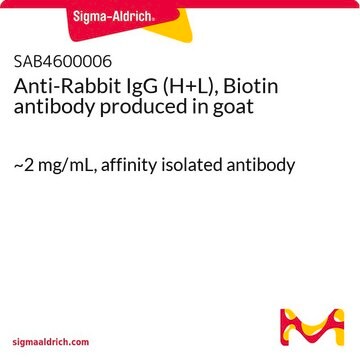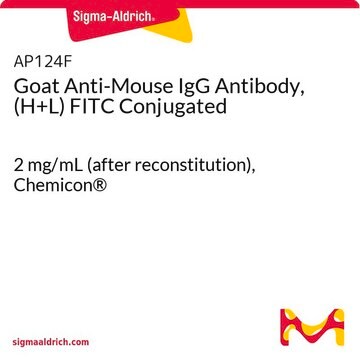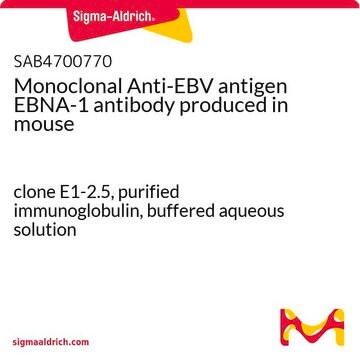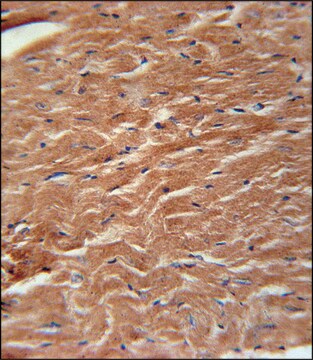MAB805
Anti-Adenovirus (Blend) Coating Antibody, clone 2/6, and 20/11
ascites fluid, Chemicon®, from mouse
Sign Into View Organizational & Contract Pricing
All Photos(1)
About This Item
UNSPSC Code:
12352203
eCl@ss:
32160702
NACRES:
NA.41
Recommended Products
biological source
mouse
Quality Level
antibody form
ascites fluid
clone
2/6, monoclonal
20/11, monoclonal
species reactivity
human
manufacturer/tradename
Chemicon®
technique(s)
ELISA: suitable
immunofluorescence: suitable
immunohistochemistry (formalin-fixed, paraffin-embedded sections): suitable
isotype
IgG1κ
shipped in
wet ice
General description
Adenoviruses are 65-80 nm, non-enveloped, regular icosahedron pathogens often associated with respiratory and gastrointestinal illness as well as conjunctivitis. Well over 40 types of adenoviruses have currently been recognized. In addition to their deleterious effects, adenoviruses have been used in vaccine production and in gene therapy. They also have the ability to trigger cell proliferation by interfering with host cellular anti-oncogenes. Since they are easy to prepare, multiple quickly and efficiently, and have the ability to infect and deliver their genome (including researcher-created constructs) to the nucleus of a variety of post-mitotic cells, adenoviruses are extremely valuable in research and medical applications ranging from virus/host cell interaction to the insertion of novel genes or regulatory mechanisms into eukaryotic cellular systems, to delivery of therapeutic anti-cancer genes.
Specificity
Reactive with all 41 serotypes of Adenovirus.
Immunogen
Adeno 3
Application
Anti-Adenovirus (Blend) Coating Antibody, clone 2/6 & 20/11 is an antibody against Adenovirus (Blend) Coating for use in ELISA, IF, IH, IH(P).
EIA: 1:1000
IFA: 1:200
Immunohistochemistry: 1:400 - 1:1000 for formalin fixed paraffin-embedded or frozen tissue.
Optimal working dilutions must be determined by end user.
IFA: 1:200
Immunohistochemistry: 1:400 - 1:1000 for formalin fixed paraffin-embedded or frozen tissue.
Optimal working dilutions must be determined by end user.
Research Category
Infectious Diseases
Infectious Diseases
Research Sub Category
Infectious Diseases - Viral
Infectious Diseases - Viral
Physical form
Ascites fluid containing no preservatives.
Unpurified
Storage and Stability
Maintain for 1 year at -20°C from date of shipment. Aliquot to avoid repeated freezing and thawing. For maximum recovery of product, centrifuge the original vial after thawing and prior to removing the cap.
Analysis Note
Control
Adenovirus Control Slides, Catalogue Number 5009-5
Adenovirus Control Slides, Catalogue Number 5009-5
Other Notes
Concentration: Please refer to the Certificate of Analysis for the lot-specific concentration.
Legal Information
CHEMICON is a registered trademark of Merck KGaA, Darmstadt, Germany
Disclaimer
Unless otherwise stated in our catalog or other company documentation accompanying the product(s), our products are intended for research use only and are not to be used for any other purpose, which includes but is not limited to, unauthorized commercial uses, in vitro diagnostic uses, ex vivo or in vivo therapeutic uses or any type of consumption or application to humans or animals.
Storage Class
10 - Combustible liquids
wgk_germany
nwg
flash_point_f
Not applicable
flash_point_c
Not applicable
Certificates of Analysis (COA)
Search for Certificates of Analysis (COA) by entering the products Lot/Batch Number. Lot and Batch Numbers can be found on a product’s label following the words ‘Lot’ or ‘Batch’.
Already Own This Product?
Find documentation for the products that you have recently purchased in the Document Library.
Silencing E1A mRNA by RNA interference inhibits adenovirus replication.
Y-S Chung,M-K Kim,W-J Lee,C Kang
Archives of Virology null
Oncolytic virotherapy for prostate cancer by E1A, E1B mutant adenovirus.
Makoto Satoh, Hua Wang, Shigeto Ishidoya, Hisashi Abe, Takuya Moriya, Hirofumi Hamada, Yoichi Arai
Urology null
Yue-Hong Shen et al.
PloS one, 11(1), e0147173-e0147173 (2016-01-23)
CAR is a transmembrane protein that is expressed in various epithelial and endothelial cells. CAR mediates adenoviral infection, as well as adenovirus-mediated oncolysis of AxdAdB-3, an E1A/E1B double-restricted oncolytic adenovirus, in prostate cancer cells. This study further assessed the therapeutic
Ran-Yi Liu et al.
Anatomical record (Hoboken, N.J. : 2007), 296(12), 1833-1841 (2013-10-19)
An E1B55K-attenuated adenovirus, dl1520, has been shown to replicate selectively in and lyse tumor cells. In this study, the antitumor activities of dl1520, alone or in combination with the chemotherapeutic agent cisplatin, were investigated in nasopharyngeal carcinoma (NPC) cells. The
R Alemany et al.
Methods in molecular medicine, 35, 395-412 (2000-01-01)
It is important to analyze to what extent these random or designed mutations abrogate viral replication in normal cells because a tightly controlled vector could be injected at higher doses intratumorally or even systemically. On the other hand, it is
Our team of scientists has experience in all areas of research including Life Science, Material Science, Chemical Synthesis, Chromatography, Analytical and many others.
Contact Technical Service







